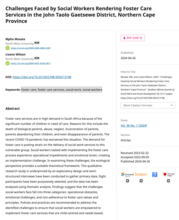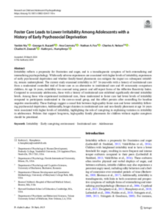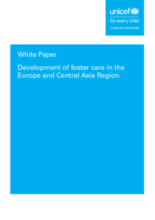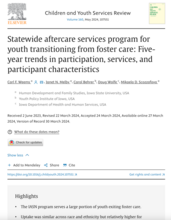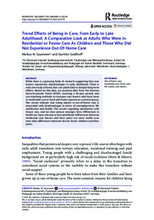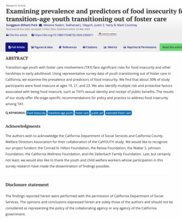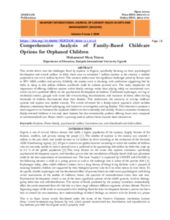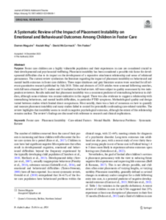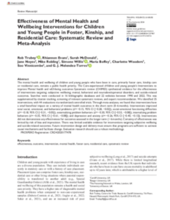Displaying 51 - 60 of 2221
This is a qualitative research study to gather primary data to examine the high demand for foster care services in South Africa and the impact on the country's social work services.
The current study examined irritability in 107 16-year-olds with a history of institutional care from a randomized controlled trial of foster care as an alternative to institutional care and 49 community comparison children.
The development of foster care in the Europe and Central Asia (ECA) region should be seen in the context of a global movement for child care system reform, framed by the key principles of the United Nations Convention on the Rights of the Child (C
The purpose of this study was to examine trends in participation and understand the experiences of youth transitioning from foster care who were involved in the Iowa Aftercare Services Program.
This article addresses two issues: whether the inequalities faced by cared for children will persist in different stages of their lives and whether these inequalities are dependent on the specific out-of-home care setting, i.e. residential or foster care. The authors examine data from the German Socio-Economic Panel (SOEP), covering a 50-year period.
Using representative survey data of youth transitioning out of foster care in California, the authors of this study examine the prevalence and predictors of food insecurity. They found that about 30% of study participants were food insecure at ages 19, 21, and 23.
The survey results presented in this report highlight increasing efforts by states, the District of Columbia and Puerto Rico to promote kinship care and support the caregivers of children who are known to the child welfare system. At the same time, the report calls on states to do more to help willing kin caregivers access and benefit from foster care licensing.
This article delves into the challenges faced by orphans in Nigeria, specifically focusing on their psychological development and overall welfare. The article advocates for a family-centric approach, which includes adoption, community-based upbringing, and initiatives to strengthen existing families.
The current review synthesizes the literature regarding the impact of placement instability on behavioural and mental health outcomes in foster care children. Three major databases and grey literature sources were searched for all relevant quantitative research published by July 2019.
The purpose of this CHIMES review and meta-analysis was to evaluate the effectiveness of interventions evaluated via randomized controlled trials (RCTs) for improving mental health and wellbeing outcomes for care experienced children and young people.

